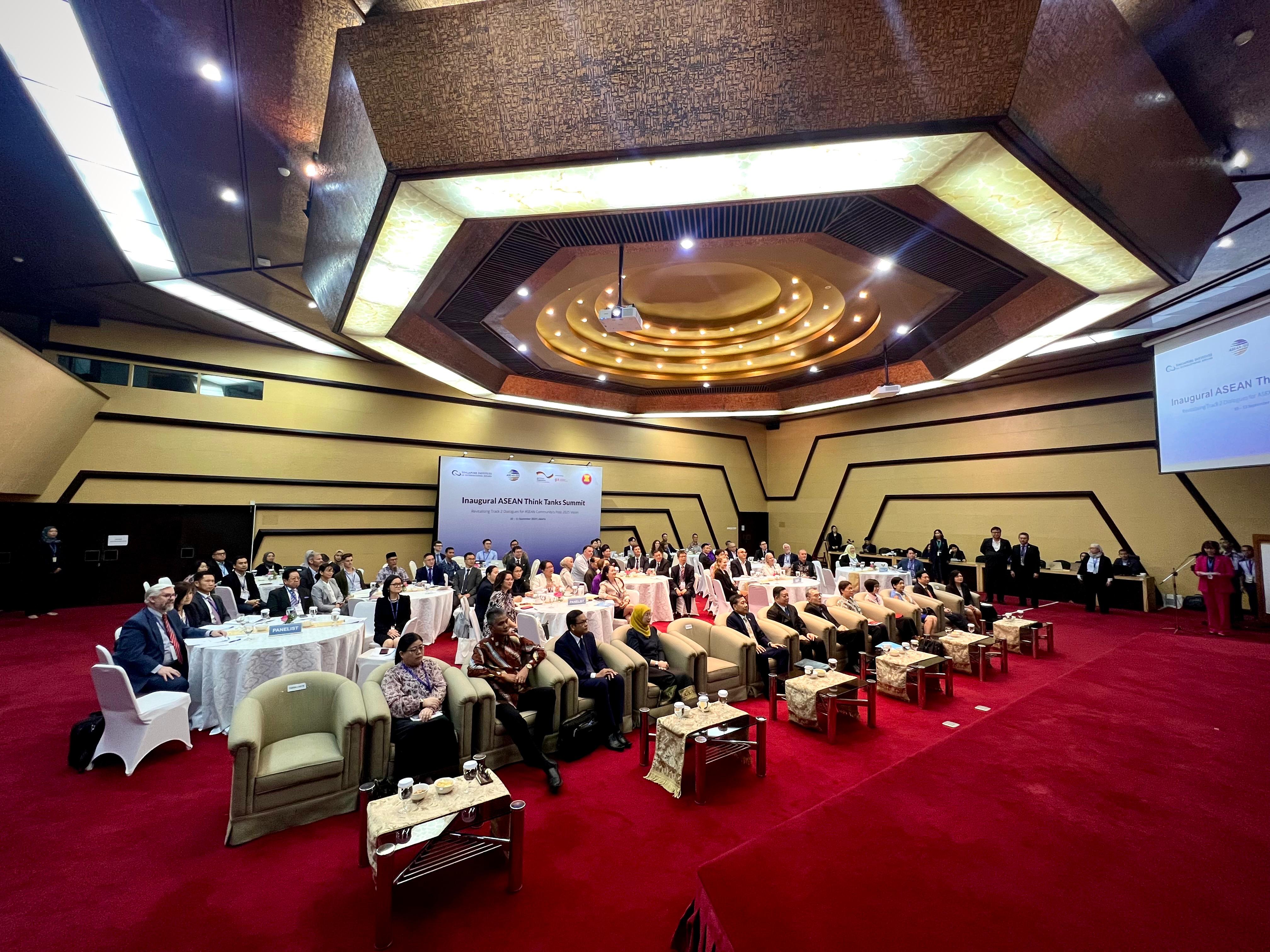The inaugural ASEAN Think Tanks Summit (ATTS) convened on September 10th in Jakarta, marking a pivotal moment in the region's efforts to address emerging geopolitical and economic challenges. Organised by the Singapore Institute of International Affairs (SIIA) on behalf of the ASEAN Institutes of Strategic and International Studies (ASEAN-ISIS) — an ASEAN-accredited entity listed in Annex II of the ASEAN Charter — and supported by the ASEAN Secretariat, with funding assistance from the German Federal Foreign Office and implemented by GIZ, the ATTS assembled thought leaders and key representatives from ASEAN-focused think tanks and dialogue partners to promote a forward-looking agenda for the region's future.
The ATTS represents a groundbreaking initiative by the SIIA, aimed at reinvigorating Track II Dialogue. It seeks to synergise efforts across the region, providing a platform to contribute strategic ideas that address ASEAN’s most pressing priorities. These discussions are especially timely as they precede the upcoming 43rdand 44th ASEAN Summits in October 2024, where the recommendations generated here will be submitted as a policy memo to ASEAN leaders for consideration.
SIIA Chairman Associate Professor Simon Tay said, “The ATTS is an ambitious effort to chart a course for ASEAN’s future. As a think tank, SIIA aims to gather diverse perspectives and present actionable ideas that reinforce ASEAN’s centrality and connectivity and contribute to the region’s development.”
"By working closely with ASEAN governments and the Secretariat, we aim to ensure ASEAN remains a resilient and dynamic player on the global stage. This involves a renewed focus on deeper integration, enhanced connectivity, and proactive collaboration, all key elements of the much-needed ASEAN Reboot," added Prof. Tay.
Secretary-General of ASEAN, Dr Kao Kim Hourn, said in his opening remarks, ‘’I am very optimistic that the discussions and interactions at this inaugural Forum will lead to innovative solutions, enhanced partnerships, and strengthened cooperation among all think tanks, especially those based in the ASEAN region.’’
‘’I envision this ATTS to be a catalyst and a bridge in bringing think tanks of ASEAN and Dialogue Partners together and working closely with ASEAN Member States officials for collaborative and inclusive policymaking, which is significant in building ASEAN’s resilience and constructive in realising the post-2025 vision for ASEAN Community and integration agenda,’’ he added.
Dr. Kao Kim Hourn also stated that ASEAN seized the momentum and the opportunity to champion trade liberalization and open regionalism, advancing intra-regional economic integration while embedding itself more deeply into the global economy. Capitalizing on this strategic moment, ASEAN emerged as a driving force in shaping a multilateral security architecture that promotes cooperative and comprehensive security, fostering dialogue and collaboration not only among its member states but also with the relevant major powers near and far to address both conventional and non-traditional security challenges. Through an extensive network of ASEAN-led mechanisms—including the ASEAN Regional Forum (ARF), the ASEAN Plus Three (APT), the East Asia Summit (EAS), and the ASEAN Defence Ministers' Meeting-Plus (ADMM-Plus)—ASEAN has established itself as a central player in regional dialogue and diplomacy, peace and security, as well as consultations and cooperation.
At the heart of the ATTS are five key focus areas identified as critical for ASEAN’s progress focusing on connectivity and centrality:
- Enhancing Digital Connectivity: Building a competitive digital ASEAN that can thrive in the global economy.
- Strengthening Energy Connectivity: Promoting cooperation on climate goals to foster a sustainable ASEAN climate community.
- Building Institutional and Political Connectivity: Creating a resilient ASEAN capable of addressing challenges.
- Maintaining ASEAN’s Centrality: Fostering unity and proactively managing regional tensions to keep ASEAN central in global affairs.
- Operationalising ASEAN’s Outlook on the Indo-Pacific (AOIP): Leveraging synergies between the AOIP and the Indo-Pacific strategies of major powers to rebuild strategic trust and enhance cooperation.
To foster a more inclusive discussion, the ATTS extended invitations beyond ASEAN think tanks to include ASEAN Dialogue Partners. This broader participation reflects a commitment to fostering diverse perspectives, ensuring ASEAN’s future is shaped by a comprehensive and inclusive dialogue. The 2-day summit was attended by almost 100 participants from the ASEAN Member States and the external partners, highlighting the extensive regional and international engagement in promoting and facilitating Track II diplomacy and dialogues.
The success of this inaugural summit was expected to pave the way for continued and expanded dialogues in the coming years, reinforcing ASEAN’s capacity to address global challenges. Amid heightened global expectations and growing skepticism, ASEAN must intensify its efforts to strengthen its connectivity and central role in regional affairs and diplomacy.




















